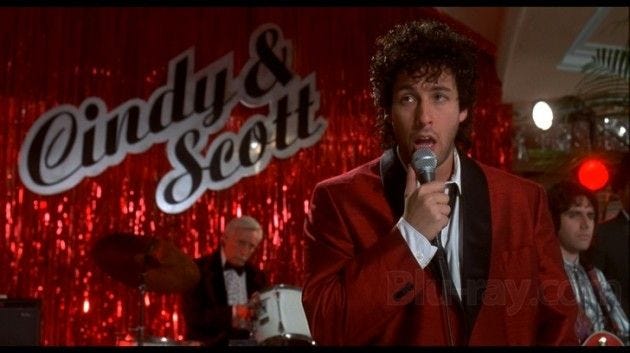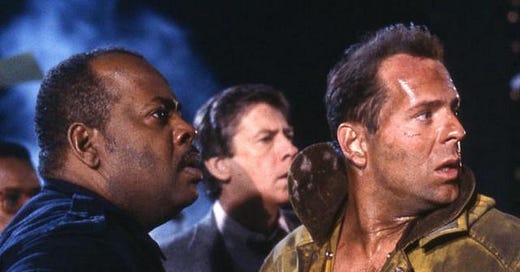What Die Hard And John McClane Taught Us About Facing Challenges
Die Hard was released (in just 21 theaters), 35 years ago this week on July 15th, 1988
“Come out to the coast. We’ll get together. Have some laughs.”
Die Hard (A little plot synopsis)
Die Hard launched Bruce Willis into the stratosphere and immediately put him on the same action-hero level as Sylvester Stallone, Arnold Schwarzenegger, Wesley Snipes, Chuck Norris, and Bruce Lee. Willis starred as a New York City police officer named John McClane, who is invited by his wife, Holly, (played by Bonnie Bedelia) to her company Christmas party in Los Angeles at — you guessed it — Nakatomi Towers.
Before he really has a chance to enjoy the celebration, terrorists — not really terrorists, but more like an international crime gang — led by Hans Gruber (played magnificently by the late great Alan Rickman) take over the building and the party. The bad guys have their eyes on a very lucrative heist of $600 million in bonds from the vault in the building and McClane is thrust into the unenviable position of having to try to stop them with minimal resources.
McClane’s team is composed of his wife, who takes a leadership role with the hostages after her boss is executed, and Al Powell (played by the super-underrated Reginald VelJohnson), a Los Angeles police sergeant on the ground, who McClane only knows through a walkie talkie.
Again, because it was an ’80s movie, it did have a happy ending and eventually this trio take Oingo Boingo’s 1986 hit song seriously and turn the company Christmas party into a “Dead Man’s Party” via the killing and dismantling of all the terrorists/ international crime gang members.
Throughout it all, McClane keeps his sense of humor and the banter between him and Sgt. Powell is all world. It’s just a super-fun, action-packed, entertaining film that had (and continues to have) a huge impact on popular culture. It spawned one of the great action heroes of all time and will go down in the cinematic history annals as one of the best action and Christmas movies. Yes, I’m on the side of “Die Hard is a Christmas movie.” More on that later.
So, what did John and Holly McClane, Sgt. Al Powell, and a bunch of international crime-gang terrorist-type guys (but mainly John McClane) teach us?
Oftentimes, the best way to face a tough or challenging situation is with levity and humor.
Humor helps in nearly any situation — not just when you’re facing off with a bunch of terrorists. Just think about how humor has helped in your own life and work — when a sense of humor saved the day during a crisis, or when a well-placed giggle broke the ice at a funeral or other high-stress moment. We need humor. In fact, we also need comedians more than most people realize.
I think a lot of my friends whose marriages ended in divorce might still be together if they would have had a comedian as a marriage counselor instead of going the traditional counselor route. Humor and comedy can be the best medicine in the most difficult of times. Many comedians talk about how some of their best humor came from individual life challenges.

Even when someone is facing imminent death, humor is still prevalent and often instigated by the patient who is terminal. A study done at Kent State and reported in the American Journal of Hospice and Palliative Care revealed that humor was present in 85 percent of 132 observed nurse-based visits. Amazingly, they found that 70 percent of the humor was initiated by the patient themselves — the person who has the most reason to be sad or angry. 1
So why wouldn’t a cop trapped in a building with limited resources and a bunch of criminals hellbent on destroying everything and everyone in their path also resort to a little humor?
Have you ever found yourself laughing somewhat awkwardly or maybe cracking a joke in a difficult or challenging situation? With business challenges, we are taught to buckle down, get serious, and come together to solve the problem. “Our widget sales are down, and this is no laughing matter,” someone says with firmness at the management meeting.
I don’t have any studies on this, of course, but I would imagine that if business leaders brought a little levity and humor to the toughest of meetings, they might find that when everyone loosens up a bit, they also think more clearly and with more open minds. I would also imagine that it might lead to faster, more unique, and ultimately smarter solutions to their problems.
“Come out to the coast…”
As we discussed earlier, when John McClane is traversing through the building’s HVAC ducts, he is having a conversation with himself to lighten up the mood a bit. Beyond his sarcastic shot at his wife, Holly, for inviting him to the party by saying - “Come out to the coast, we’ll get together, have a few laughs.”
He also says this as he flicks the lighter, producing a flame within the metal vent:
“Now I know what a TV dinner feels like.”
Sidenote here: If you were born after 1990, you may not have had the pleasure of eating a TV dinner, complete with what was surely a very safe silver aluminum covering that looked like metal siding.
John McClane and Challenges
McClane finds himself in what feels like an impossible situation, but rather than make it worse by dwelling on all the challenges he’s facing, he makes his situation a lot more tenable by cracking a few jokes. Let’s take a quick look at the list of challenges McClane is facing:
Lack of intel. He initially has no knowledge of the enemy, their capabilities, and numbers.
Severely outnumbered by the enemy. Something like 13 to 1.
Severely outgunned and under-resourced. He only has a standard-issue sidepiece and a lighter. The enemy has an arsenal of weapons as well as an IT/tech genius capable of equal disruption and destruction.
He does not have shoes. He had taken them off in his wife’s office to relax after his flight just as the enemy struck and he had to take off without them. Lots of bullets flying around means lots of broken glass, which doesn’t bode well for bare feet.
The only person who he can communicate with is Sgt. Powell via walkie talkie, and Powell is outside of the building with zero-to-little visibility into the terrorists’ movements.
Perhaps his biggest challenge was that he was unprepared to be in this situation. He flew across country from New York City to Los Angeles for his wife’s company Christmas party and some rest and relaxation. He was not in a “singlehandedly take on and destroy an international terrorist gang” mindset, but here he was having to do exactly that.
McClane is in a tough spot for sure and, even though this is an ’80s action movie, he doesn’t have the benefit of unlimited hand grenades and machine guns à la Schwarzenegger in the 1985 shoot ’em up, Commando, in which he racked up a then-record 81 kills.
McClane does, however, have his sense of humor and it shows up again after he kills one of the terrorists, puts a Santa hat on him and writes on his sweatshirt, “Now I have a machine gun. Ho-Ho-Ho,” which I have on a t-shirt in my closet. See ... it’s a Christmas movie.
Throughout all his challenges, uncertainty, fear, and a few near-death experiences, there is one constant in McClane’s Nakatomi Towers world — humor. It gets him through. It helps him keep his mind clear. It keeps him level and sane. It saves his life and the lives of the hostages including his wife. Had he gone negative and allowed his head to be filled with despair, he would have likely given up, as so many do when faced with what feels like insurmountable challenges.
The greatness of Jim Valvano
When we see others refusing to give up when the going gets tough, it emboldens us all. I am reminded of Jim Valvano, who was the college basketball coach at North Carolina State in the ’80s, an era in which he and his team won the 1983 college basketball championship. Valvano was diagnosed with metastatic cancer in 1992 and delivered one of the greatest and most moving speeches of the modern era during the 1st Annual ESPY Awards (ESPN Sports Awards) at Madison Square Garden on March 4, 1993.
At this point, his body had been ravaged with tumors and his best friend, Dick Vitale (or Dickie V., as we college basketball sports fans call him), helped him onto the stage. Once Valvano reached the podium, he accepted the inaugural Arthur Ashe Courage Award named after the professional tennis player who valiantly and publicly fought an AIDS diagnosis that likely stemmed from a blood transfusion during a 1983 coronary artery bypass surgery.
Before his untimely death, Ashe started the Arthur Ashe Foundation for the Defeat of AIDS and worked to educate others about HIV and AIDS. After accepting the award, Valvano announced the creation of The V Foundation for Cancer Research, which — the last time I checked — had raised more than $290 million that has been distributed in the form of cancer research grants. In Valvano’s acceptance speech at the ESPYs, he said this:
“To me, there are three things we all should do every day. We should do this every day of our lives. Number one is laugh. You should laugh every day. Number two is think. You should spend some time in thought. And number three is you should have your emotions moved to tears, could be happiness or joy. But think about it. If you laugh, you think, and you cry, that’s a full day. That’s a heck of a day. You do that seven days a week, you’re going to have something special.”
At this point, they were running short on time, and Valvano was flashed a 30-second warning to him on the teleprompter, to which he replied:
“That screen up there is flashing 30 seconds, like I care about that screen right now, huh? I got tumors all over my body and I’m worried about some guy in the back going ‘30 seconds.’”
The audience laughed (and cried and thought). Valvano embraced humor and levity in the face of a terminal cancer battle that he was losing quickly. As he said at the end of his speech, which is now the motto for the Jimmy V Foundation, “Don’t give up. Don’t ever give up.” You don’t have to be a famous basketball coach or a celebrity to find ways to use humor to help you through the tough times.
Humor, Levity and Grief
Humor most certainly got me through the most difficult stretch of my life. I had quite a run of challenges in 2021. My then-girlfriend struck out on her own, chasing a life journey that needed to be filled, leaving in her RV in March of 2021 after a whirlwind romance that changed us both and you can read about in my short-story memoir, Coffee. Love. And a Cross-Country Road Trip. My stepmom was diagnosed with and passed away from pancreatic cancer all within a three-week period during April of 2021. My mom passed away from Alzheimer’s in July of 2021. And we moved my dad into independent living in February of 2022. Yeah, my life was a country song. There were three things that kept me afloat during this time:
1. My sister. We kept each other afloat.
2. My rescue dog and best friend, Bodhi.
3. Humor and laughter.
Throughout it all, we kept our sense of humor and, more importantly, so did our mom, stepmom, dad, and stepdad. Collectively, we joked with our mom about our love for Neil Diamond and her equal disdain for him, up until the very end. My stepmom blamed my dad’s cooking for her weight loss even in the face of certain death. We laughed with my stepdad about how even when my mom’s eyes were closed and she couldn’t move, she would know if you were touching her stuff and, without opening her eyes, would say, “Why are you touching my stuff? Stop touching my stuff!”
And we learned to laugh when she would say his name and my sister’s name over and over again for them to come to her even when I was standing right there. She would say, “Jimmy, Jimmy, Jimmy jim jim” (my stepdad’s name) and I would say “Mom,
he’s downstairs. I’m right here if you need something.” She would respond with, “Stop it, Christopher. Just stop it,” and then would call for my sister, “Ashleigh, Ashleigh, Ashleigh.” We just laughed together when it happened and still laugh about it to this day.
When we moved my dad into an independent living community, like a lot of people in his situation, he was concerned about outliving his finances. My sister and I reminded him that we watch a lot of “true crime” shows and if he gets close to running out of money for the independent living facility, that we know how to “take care of things” for him painlessly, quietly, and without leaving a trace of evidence.
Keep Laughing
Through it all, I just try to keep laughing. And reminiscing. Surely, my love for ’80s comedies has kept my funny bone intact. Humor works — for me, for you, for all of us. My sister and I fought multiple life challenges with humor, Jim Valvano fought terminal cancer with humor, and John McClane fought terrorists with humor. Maybe there is something to this “laugh every day” thing.
It’s, of course, important to face your challenges — in the work- place and in life — with determination, positivity, grit, and a belief in self. Just don’t forget to throw in a side of humor and take some time to laugh.
Marilyn A. Mendoza, PhD, “The Healing Power of Laughter in Death and Grief,” Psychology Today, November 7, 2016, https://www.psychologytoday. com/us/blog/understanding-grief/201611/the-healing-power-laughter-in- death-and-grief.







